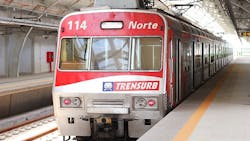Sport Events Fuel Boom in Brazil's Rail Sector
SAO PAULO -- Upcoming sporting mega-events are fueling a boom in Brazil's rail sector, with planned investments of tens of billions of dollars whetting the appetites of foreign suppliers.
Set to host the soccer World Cup in 2014 and the Rio summer Olympics two years later, this continent-sized country of 194 million people is hobbled by congested airports, ramshackle roads and major urban traffic jams.
It needs to drastically expand its urban mass transit and inter-city rail networks to ferry the estimated 500,000 foreign tourists and three million Brazilians expected to attend matches in 12 host cities for the first World Cup to be held in Brazil since 1950.
Brazil is spearheading an investment drive in rail infrastructure across Latin America, where revenues for the supply industry are expected to grow 7% from 2015 to 2017, a pace second only to Africa and the Middle East.
That growth drew industry experts from around the world to Sao Paulo this week for LatAm Rail Opportunities 2013, an event sponsored by the Brazilian transport ministry and various industry groups.
The two-day conference -- attended by Brazilian, British, Swiss, U.S., German, French, Italian, and Canadian firms -- focused on rail finance, expansion and procurement, and maximizing rail safety in Latin America.
"Brazil's commitment to making transport efficient will result in rich rewards," said Amjad Bangash, managing director the rail division at Bechtel.
The meeting came just as Brazilian authorities are set to begin auctioning licenses to domestic and foreign firms to run railways and airports.
Last August, the government said private companies would be able to bid on concessions for 10,000 kilometers (6,200 miles) of train tracks -- through a mix of state and private investments estimated at $45 billion.
Brazil currently has about 30,000 kilometers (18,600 miles) of railways, and plans are to nearly double the network by 2023, according to industry experts.
Authorities are also keen to boost use of freight rail, which now accounts for about 25% of freight traffic.
Last year 2,919 freight cars were built, along with 70 locomotives and 207 passenger cars. For 2013, roughly 3,000 freight cars and 100 locomotives should be built and passenger car manufacturing should increase to about 400, according to the national railroad industry association Abifer.
Foreign companies such as Alstom (IW 1000/159), Bechtel and Bombardier (IW 1000/241) are keen to get a piece of the rail business in Rio and Sao Paulo.
"We have a great interest in the metro lines being expanded in Rio and Sao Paulo as well as in the high-speed train that will link the two cities," Bangash said.
"Currently we have a small team working with Rio Metro, but we want to do more," he said.
He urged Brazilian authorities to provide investors with incentives, including "reducing red tape, simplifying the taxation mechanism, freeing up the movement of money and allowing needed skilled employees into the country.
Waldir Peres, an official in the Rio state transport secretariat, meanwhile outlined plans for a light rail project near the city center and extension of the Rio metro to the suburb that will house the Olympic village.
A 22-kilometer line will link the suburb to Rio International Airport.
The Brazilian National Transport Agency ANTT has meanwhile called for tenders for a planned 317-mile high-speed rail line that will connect Rio to Sao Paulo and Campinas, with completion scheduled in 2018.
Hyundai (IW 1000/54), Siemens (IW 1000/34), Mitsui, CAF and Talgo as well as the local subsidiary of GEC Alsthom have expressed interest in the project. The winner is to be announced in September.
In Sao Paulo, the country's most populous city, the 74.3-kilometer (46.2 mile) metro network currently carries four million passengers per day.
Plans are to increase its capacity to six million passengers a day by 2014, with extension of the network from 66 to 137 kilometers.
Gerard Aziakou, AFP
Copyright Agence France-Presse, 2013
About the Author
Agence France-Presse
Copyright Agence France-Presse, 2002-2025. AFP text, photos, graphics and logos shall not be reproduced, published, broadcast, rewritten for broadcast or publication or redistributed directly or indirectly in any medium. AFP shall not be held liable for any delays, inaccuracies, errors or omissions in any AFP content, or for any actions taken in consequence.
